Marshall Aerospace and Defence has signed a new multi-million-pound contract with the Bangladesh Air Force to support surplus C-130J aircraft purchased from the UK.
This new multi-year contract follows on from a contract signed in May 2018 and will see Marshall provide total support to the entire Bangladesh Air Force C-130J fleet.
This contract was signed in accordance with a Government-to-Government agreement for the sale of an additional batch of former Royal Air Force C-130J aircraft from the UK MoD to the Bangladesh Air Force.
Marshall say it will deliver aircraft maintenance, logistics support, including the provision of spare parts and ground support equipment for establishing local capabilities, as well as engineering services to ensure the effective operation of the entire fleet.
The company will also carry out capability enhancement modifications to the avionics equipment and provide a passenger transport capability, as well as in-country technical support to the operator for an initial period, along with specific technical services to support the longer-term sustainment of the fleet.

Alistair McPhee, CEO of Marshall Aerospace and Defence Group, said at the contract signing ceremony:
“We are delighted to see the Bangladesh Air Force further strengthen its important airlift capability with the purchase of additional C-130Js from the MoD and are proud to support them with their fleet’s entry into service.
The Bangladesh Air Force can fully rely on Marshall to support them as they continue to play such an important role in UN peace-keeping and humanitarian missions around the world.”
Deputy British High Commissioner to Bangladesh, Kanbar Hossein Bor, said at the contract signing ceremony:
“I am delighted to see today’s event build on the success story that is the growing UK-Bangladesh defence relationship.
Our two countries are committed to an ever-deeper partnership across the full spectrum of security activity, including disaster response and UN peace-keeping. These aircraft are an excellent demonstration of this cooperation. We also recognise the important role of Marshall Aerospace and Defence Group as the UK Government’s industrial partner in supporting both countries with their global commitments.”


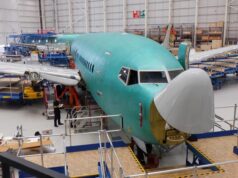
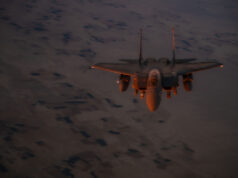
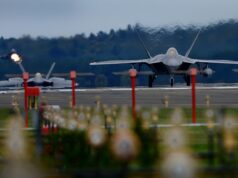
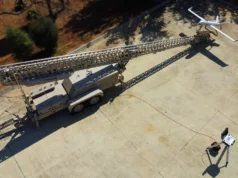
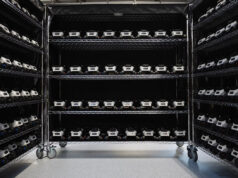
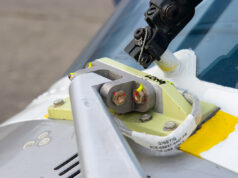
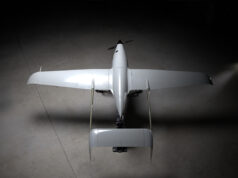
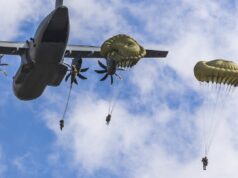
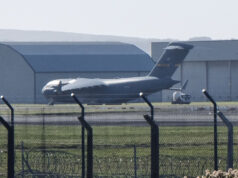


Pity they have the Union Jack upside-down!
To be fair it must be a little confusing (a majority of Brits wouldn’t have realised either) and I can imagine many people think the flag is completely symmetrical.
At least it is the right way round on the screen.
With the pollical situation as it is, the flag being upside down is rather appropriate! Good to see Labour getting off the fence today….2nd referendum now looking much more likely. Good news for the whole of Europe.
What are the numbers? Has the UK any short body C-130J left now?
I don’t think we do.
I might be wrong here but, 4 have gone Bangla, 1 to USA and one is being kept in lieu of a lost stretched version. That leaves 4 out of a total of ten ….should be adapted either for marine patrol or helicopter refuelling!
Spent a number if years looking down out of office window watching c130s doing short take off and landing drills at Tejgaon air base in Dhaka when on posting there. They used to really push the planes and pilots getting ready for various UN duties…mainly in Africa.. which was a major foreign revenue earner for the Bangladeshi govt.
I bet we gave them these for nothing along with the many millions in foreign aid we give them, foreign aid should not be almost half of our defence expenditure!! Not even a quarter! Maybe a tenth and that’s generous.
Give it a rest mate…you keep banging on about ungrateful foreigners! The UK gets a lot out of the aid budget….believe you me, the government wouldn’t be doing it if it weren’t!
Simplistic view that foreign aid budget is wrong grows old. There are far bigger wastes of money that the government spends with far less benefit to the Uk…
https://www.psa.ac.uk/psa/news/does-uk-international-development-aid-benefit-britain
“A 2014 ODI report showed that in 2014 every $1 of UK aid spent generated an increase in UK exports of $0.22 thereby providing an estimated 12,000 extra UK jobs.”
“In addition to trade benefits, development aid also allows Britain a positive audience with many developing nations, and it allows Britain to push its agenda overseas, be it in terms of security, immigration or human rights concerns.”